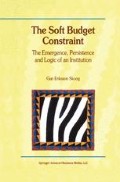Abstract
The transition of the formal Tanzanian economic and political system into a more democratic and market-oriented order has proceeded throughout the 1990s. In 1995, the first multi-party election was held and Benjamin Mkapa, generally perceived to be committed to reform, was elected president. By and large, macro-economic performance of the system in transition has continued to improve, but the economic situation is still fragile, effective structural change moderate and many reforms remain to be implemented.1 Besides, any formal change takes place within the context of the informal rules and relationships of the economy of affection.2
Access this chapter
Tax calculation will be finalised at checkout
Purchases are for personal use only
References
See, for instance, Bigsten and Danielson (forthcoming), Danielson and Mjema (1999), Chapter 2, and (2000), Chapter 3, on the accomplishments and challenges of Tanzanian reform.
Chabal and Daloz (1999) offer a recent contribution on the role of informal rules and relationships in Sub-Saharan African societies, in particular on the consequences for the state.
Bigsten and Danielson (forthcoming), p. 118.
Kühnel (2000a).
Bigsten and Danielson (forthcoming), pp. 98–99; United Republic of Tanzania (1996), p. 7.
Bigsten and Danielson (forthcoming), 121–126; Price Waterhouse-Coopers (1999). See Danielson and
Eriksson Skoog (forthcoming), for a discussion of the characteristics of the Tanzanian state in the 1990s.
Bigsten and Danielson (forthcoming), pp. 85 and 100; International Monetary Fund (1996), p. 7. Danielson and Eriksson Skoog (forthcoming) survey preliminary indications of the soft budget constraint in the 1990s.
In 1995, 41 parastatals were reported to have made losses of totally 24 billion TSh, equivalent to around 4
per cent of the official GDP. (World Bank, 1995, p. 10.)
Kühnel (2000b).
Bigsten and Danielson (forthcoming), pp. 23 and 123–125.
Fjeldstad (1999).
Danielson and Mjema (1999).
Catterson and Lindahl (1999).
Author information
Authors and Affiliations
Rights and permissions
Copyright information
© 2000 Springer Science+Business Media New York
About this chapter
Cite this chapter
Skoog, G.E. (2000). Epilogue. In: The Soft Budget Constraint — The Emergence, Persistence and Logic of an Institution. Springer, Boston, MA. https://doi.org/10.1007/978-1-4757-6793-3_7
Download citation
DOI: https://doi.org/10.1007/978-1-4757-6793-3_7
Publisher Name: Springer, Boston, MA
Print ISBN: 978-1-4419-4993-6
Online ISBN: 978-1-4757-6793-3
eBook Packages: Springer Book Archive

